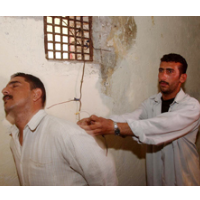A Decade after U.S. Invasion, Human Rights Abuses Persist in Iraq
 Iraqi torture survivor demonstrates how Basra secret police shocked him with electric wires (photo: Jon Mills, AP)
Iraqi torture survivor demonstrates how Basra secret police shocked him with electric wires (photo: Jon Mills, AP)
Are Iraqis better off now than they were under the rule of Saddam Hussein? They do enjoy more rights and freedoms today, one human rights group notes, while pointing out that human rights abuses are still a serious problem in the country, just as they were during Hussein’s dictatorship.
A new report from Amnesty International says “Iraq remains mired in human rights abuses.”
Thousands of citizens are held without trial, the organization reports, while others are serving prison sentences “imposed after unfair trials.”
The government continues to use torture against prisoners, often to achieve forced confessions, without the culprits being brought to justice, or those in power taking action to stop the mistreatment.
Much of this is done with the legal backing of Article Four of the Anti-Terrorism Law, one of the Iraqi laws that give Prime Minister Maliki’s regime a broad right to order detentions and carry out the death penalty for dozens of crimes, including kidnapping, murder, terrorism, and even damaging public property.
Since 2005, more than 3,000 Iraqis have been sentenced to death and 447 prisoners have been executed. Between 30,000 and 50,000 Iraqis are reported to be held in government detention facilities.
Amnesty International reminds the public that when President George W. Bush ordered U.S. forces to invade in 2003, the decision was partly justified “on human rights grounds, pointing to the many grave crimes committed under the Iraqi leader.”
But the toppling of Hussein and eight years of military occupation “has brought only limited change” to Iraq.
"The fighting from 2004 has never stopped," Iraqi citizen Sheikh Khaled Hamoud Al-Jumaili told Al Jazeera. "We simply switched from fighting the Americans to now we are fighting Maliki and his injustice and corruption."
“Today, assuredly, many Iraqis enjoy greater rights and freedom than existed under the ousted dictator,” the report observes, “but the margin of improvement is far less than it should be, and the country remains wracked by political, religious and other divisions and serious abuses of human rights.”
The situation in Iraq is described as “intentional state terror” by Lisa Hajjar, a professor of sociology at University of California Santa Barbara who specializes in wartime detention and torture. “When people are tortured or there are extrajudicial executions, the purpose is to dissuade others,” she told Al Jazeera. “The goal is to create a visible spectacle, and the purpose is to terrorize communities into quiescence.”
The institutionalized abuses in Iraq owe much to the abuses committed by U.S. and Iraqi forces during the U.S.-led occupation of the country, according to Sarah Leah Whitson, Middle East director at Human Rights Watch. “The abuses set in motion over 10 years ago by the Bush administration’s ‘torture memos,’ and the brutal detention policies that followed, facilitated Iraq’s creation of a system that is today either unwilling or incapable of delivering justice to its citizens.”
-Danny Biederman, Noel Brinkerhoff
To Learn More:
Maliki's Iraq: Rape, Executions and Torture (by Dahr Jamail, Al Jazeera)
Iraq 10 Years Later, Creeping Authoritarianism (Human Rights Watch)
Iraq: A Decade of Abuses (Amnesty International) (pdf)
Majority of Americans Think Iraq War Wasn’t Worth It (by Noel Brinkerhoff, AllGov)
Iraq Detainee Abuse Investigations…Just Forget about It (by Noel Brinkerhoff, AllGov)
Iraqi Torturers Carry on Tradition from Saddam and Americans (by Noel Brinkerhoff, AllGov)
- Top Stories
- Unusual News
- Where is the Money Going?
- Controversies
- U.S. and the World
- Appointments and Resignations
- Latest News
- Trump to Stop Deportations If…
- Trump Denounces World Series
- What If China Invaded the United States?
- Donald Trump Has a Mental Health Problem and It Has a Name
- Trump Goes on Renaming Frenzy






Comments